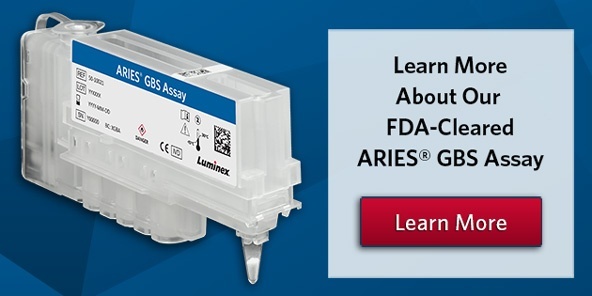New posters detail clinical data and workflow efficiency
July is International GBS Awareness Month, and we’re joining voices around the world in an effort to raise awareness for this important cause. Group B Streptococcus (GBS) is one of the biggest threats to newborn health, but remarkably few people are familiar with it. Check out our blog from earlier this month explaining the health threat.

GBS can be passed from mother to child during birth, which makes testing for a woman’s colonization status during pregnancy essential for improving infant health outcomes. One-fourth of women carry these bacteria, and testing around the 36th week of pregnancy has helped doctors treat at-risk mothers and newborns with prophylactic antibiotics.
We offer the FDA-cleared ARIES® GBS Assay to help clinical labs generate highly sensitive and specific results for expectant mothers. The assay reduces hands-on time to less than two minutes per sample for an efficient, scalable workflow. Similar to our other ARIES® assays, this test features internal barcode scanning and position-independent results to minimize the risk of manual error.
Several posters recently presented at the ASM Microbe 2017 conference evaluted the ARIES® GBS Assay:
A Multi-center Clinical Evaluation of the ARIES® GBS Assay, a Sample to Answer Real-Time PCR Assay for the Detection of Group B Streptococcus in Antepartum Women
This evaluation included 688 samples from three clinical sites to assess the clinical performance of the ARIES® GBS Assay.
Comparative Evaluation of Commercial Molecular Group B Streptococcus Assays to Determine Temporal Aspects of Assay Performance
This study compares hands-on time and turnaround time for four commercially available molecular GBS tests.
Comparison of Four Commercial Molecular Assays for Detection of Group B Streptococcus in Antepartum Rectal-Vaginal Swab Specimens Following Broth Enrichment
For this evaluation, scientists analyzed 299 samples collected from women aged 16-42.
